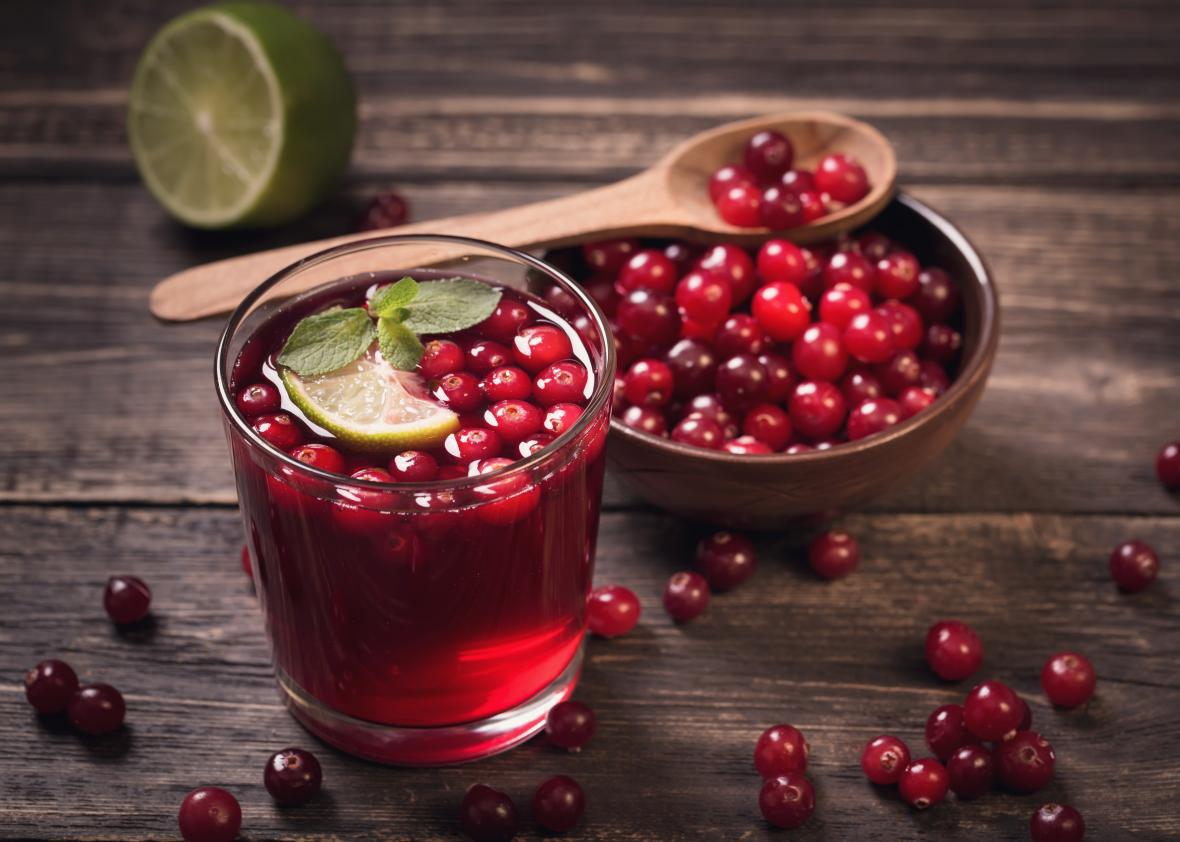Wherever there are women, there are likely to be cranberry pills—squirreled away in a bedroom drawer or passed hand-to-hand under the table at a café. Many believe that cranberry juices, and especially high-concentration cranberry supplements, can combat urinary tract infections, because the tangy fruit may contain an active ingredient that stops bacteria from sticking to the walls of the bladder. The itchy, burning, feeling-like-you-have-to-pee-all-the-time scourge of the UTI afflicts women (and occasionally men) of all ages, and especially corresponds with sexual activity and menopausal hormone changes; cranberry products are the only over-the-counter remedy. But do they work?
Vox recently suggested that they’re more or less placebos—and, where sugary fruit juices are concerned, unhealthy ones at that—in a piece with the provocative headline “How Juice Companies Game Science to Perpetuate the Myth That Cranberry Prevents UTIs.” The research is iffy: Some studies suggest a salutary effect, while others find that no number of gel capsules will ever bring relief. And Vox reports that the evidence in the “pro” column might look even thinner if it weren’t for the money that Ocean Spray—“the world’s leading producer of cranberry juices”—has poured into producing it. Exhibit A is a study co-authored by Ocean Spray staff scientists and published in the American Journal of Clinical Nutrition this month, in which scientists employed an expansive definition of what constitutes a UTI but didn’t use urine tests to determine the source of their participants’ symptoms—shrouding their data in what independent scientists told Vox was essentially “smoke and mirrors.”
Does this mean that women everywhere should flush their cranberry supplements and abandon all hope? Slate called some OB-GYNs to find out and learned that the cranberry cure is less a hoax than a persistent mystery. “The studies don’t look great, is the bottom line,” Dr. Lori Berkowitz of Boston’s Massachusetts General Hospital told me. “Having said that, I think the jury may still be out.”
Some doctors won’t even suggest cranberry supplements to their patients. “There is not credible scientific evidence that telling people to drink juice or take pills is going to prevent a UTI or treat UTIs,” says Lauren Streicher, clinical associate professor of obstetrics and gynecology at Northwestern Memorial Hospital and author of the book Sex Rx-Hormones, Health, and Your Best Sex Ever. “It’s not something I’ve ever recommended.” (Streicher also considers the idea that peeing after sex can prevent UTIs to be a myth—though even the Mayo Clinic stands by that one.) It’s not that there are no successful studies to point to: Just last year, for example, the American Journal of Obstetrics and Gynecology published a paper suggesting that cranberry juice capsules had reduced the rate of UTIs by half in women who have undergone gynecological surgery. But that study relied on a relatively small group of just 160 women; it also concerned a “very specific population,” Streicher told me, “and cannot be extrapolated to a general population.”
When small studies conflict or prove difficult to replicate, systematic reviews of the available literature are considered more reliable sources of information. All the OB-GYNs I interviewed cited a 2012 Cochrane review, which rounded up 24 studies for a total of 4,473 participants. The results were not encouraging for women seeking an end to their suffering. The data “suggests that cranberry juice is less effective than previously indicated,” the authors wrote. “Although some of small studies demonstrated a small benefit for women with recurrent UTIs, there were no statistically significant differences when the results of a much larger study were included. … [C]ranberry juice cannot currently be recommended for the prevention of UTIs.”
There’s no perfect alternative, however. The tried-and-true treatment for older women, whose risk of UTIs rises with hormonal shifts, is a topical estrogen treatment. But for younger women, doctors generally prescribe antibiotics—which can lead their patients to build a resistance not only to Bactrim, the drug generally used for UTIs, but to other antibiotics, as well.
This helps explain why some doctors continue to present cranberry pills as an option to their patients. There’s no reason not to, since the capsules are cheap, over-the-counter, and sans side effects. The same can’t be said of cranberry juices, whose sugar content promotes myriad bad outcomes—including bacterial growth. Even if doctors stopped suggesting cranberry products, women would keep taking them. In an informal office poll, multiple ladies of Slate came forward to refute the scientific consensus with anecdotal evidence. Though our numbers be but little, our devotion to this all-natural remedy is fierce.
For now, no one knows why cranberries seem to work (at least for some women) or why those effects don’t hold up in studies. “It may be age, genetic predisposition,” or other factors, Berkowitz says. She compares it to the riddle of dieting—another aspect of self-care where what works for some may fail for others, and the reasons often remain inscrutable. As for cranberry supplements, “I would say if it worked for you, keep doing it—you’re probably not imagining it,” Berkowitz says. “But we don’t know why, and we haven’t been able to prove it.”
